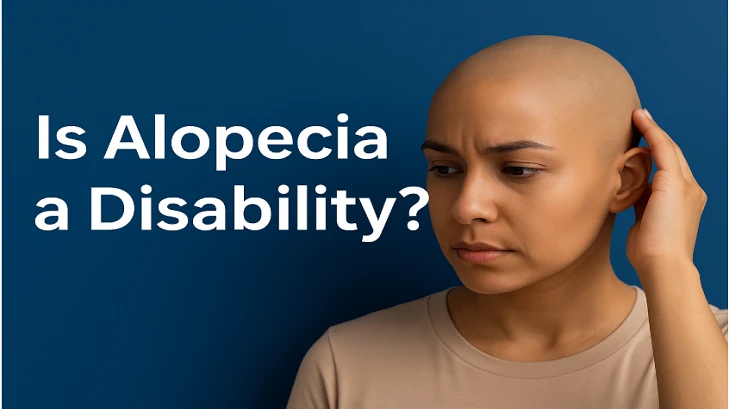- Author: Admin
- Jun 26, 2025
Alopecia, the sudden or gradual hair loss, is not included in the Blue Book listing of the Social Security Administration (SSA). If the hair loss happens from an autoimmune disease or creates severe anxiety, the situation can be in your favor.
The SSA will decide on the basis of holding a job or managing daily work. Therefore, people who keep their reports up-to-date, test results, and submit a claim.
Is Alopecia a Disability?
Alopecia is a medical condition that causes hair loss, which can be temporary or permanent. Whether or not it qualifies as a disability depends on the severity and impact of the condition on a person’s life.
Alopecia is not classified as a disability in employment or legal terms. To qualify as a disability, it should have a substantial and severe effect on your capability to work on your daily activities. Alopecia does not limit abilities. However, the mental health impact can be limited.
Is Alopecia A Disability under the Americans with Disabilities Act (ADA)?
In some cases, alopecia may be considered a disability under the Americans with Disabilities Act (ADA) if it substantially limits a major life activity such as self-care, walking, or working. However, this determination would depend on the individual circumstances and the severity of the condition.
People with alopecia may experience emotional and psychological distress as a result of their condition, such as anxiety and depression disability, which can also impact their ability to carry out daily activities. Therefore, accommodations and support should be provided to help individuals with alopecia manage their condition and overcome any limitations it may cause.

Symptoms of Alopecia
Common Symptoms of Hair Loss or Alopecia are as follows:
- Gradual thinning on top
- Round patches
- Wider part, thinner ponytail
- Receding in an M-shape in males
- Itching or burning first
- Brittle hairs
Types of alopecia
The following are different types of alopecia:
Alopecia areata: The first thing people may experience is called alopecia areata. With this version, hair falls out in small, discrete patches that seem to wander around the scalp and sometimes appear on eyebrows or even the back of a hand.
Alopecia totalis turns the entire head bald. Someone with totalis can look in the mirror and find no remaining fringe anywhere on the head.
Even rarer is alopecia universalis, a condition that strips every last strand from the body, leaving eyelashes, arm hair, and even the fine fuzz on the earlobes gone.
Who is susceptible to Alopecia Areata?
When a family member, such as a grandparent, uncle, or sibling, has the condition, your own risk rises noticeably. The American Academy of Dermatology puts that figure between 10 and 20 percent.
People who are already juggling hay fever, asthma, or atopic dermatitis often discover one more card in their deck. Down syndrome patients and some thyroid disorder sufferers see the same trend.
Cancer treatment introduces a different angle to people suffering from alopecia. A parent with alopecia certainly gives a higher chance to a child through inheritance.
Can I qualify for disability if I have Alopecia?
Yes, it is possible to receive disability for alopecia, but it depends on the severity and impact of the condition on an individual’s ability to work.
Alopecia is considered a medical condition that can affect a person’s ability to maintain employment and perform daily activities, but the Social Security Administration (SSA) has specific criteria mentioned in its Blue Book that must be met in order to qualify for disability benefits.
How Does Alopecia Affect a Person’s Life?
When someone loses hair, it may affect their life. People may suffer from stress and social unease, and in some cases, they may also experience anxiety and depression. It may affect the self-confidence of the people affected and can be emotionally challenging for them. Further, it may also affect the well-being of the people, putting them at a greater risk of scaly patches and further hair loss.
How to proceed if you suffer from alopecia?
If you suffer from alopecia and believe that your condition meets the requirements for disability benefits, it may be helpful to work with a disability attorney who can assist you with the application process and represent you in a hearing, if necessary. They can also provide guidance on the specific eligibility requirements and criteria for obtaining disability benefits for alopecia.
FAQs on Alopecia Disability
1. How do I know if I have alopecia?
If you begin to lose eyebrows, nostril hairs, eyelashes, or hair from the legs, it may be a sign that you are struggling with alopecia. Apart from hair loss, people who have alopecia areata may notice changes in their nails. They may also experience tingling sensations, itching, or burning sensations, in which hair loss may soon start.
2. Is alopecia 'just hair loss' or 'a cosmetic issue'?
Alopecia cannot only be considered just skin deep, it is a consequence when your immune system goes haywire under the surface of the body. Alopecia is classified as an autoimmune disease when the body attacks its own tissues and cells.
3. Can I be fired or denied a job because of my alopecia?
The answer is no. It is not legal to fire a person from a job or not hire a male or female owing to their baldness. It comes under the law that protects against discrimination.
4. Is there specific medical documentation required for claiming disability due to alopecia?
You must submit documents that prove that your skin disorder is a medically determinable impairment from an acceptable medical source (AMS). Moreover, SSA may also require medical history, records of treatment, and other relevant laboratory findings.


